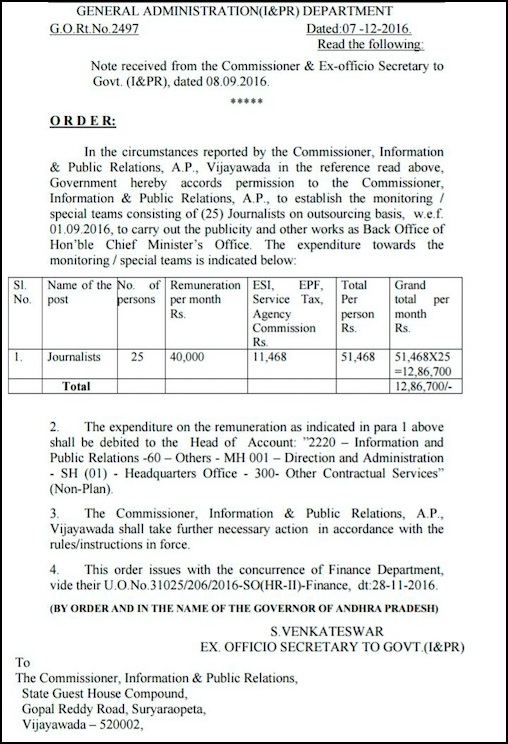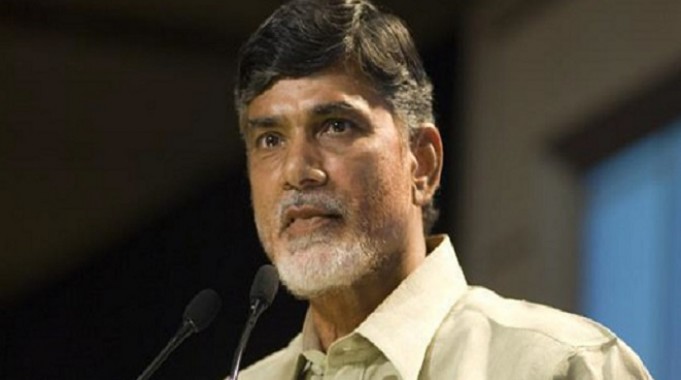Facility or favour?
Andhra Pradesh chief minister Chandrababu Naidu.
The government of Andhra Pradesh, led by Chandrababu Naidu has floated a new scheme for journalists. It has issued a GO. Rt. No 2497 on 7 of December 2016, which says, “Government hereby accords permission to the Commissioner Information & Public Relations, A.P., to establish the monitoring/special teams consisting of (25) journalists on outsourcing basis, w.e.f. 1.9.2016, to carry out the publicity and other works as Back Office of Hon’ble Chief Minister’s Office.”
The G.O. goes on to indicate that each ‘out-sourcee’ journalist will be paid up to 51,500 rupees per month. The total per month expenditure of 12,86,700 rupees (1,54,40,400 per year) towards the monitoring/special teams will come from the head of account of Information & Public Relations.

The orders are effective retrospectively from 1.9.2016, though the order itself is dated 7.12.2016. This probably means that there are at least 25 special team journalists already ensconced in the back-pocket of the CM’s office, monitoring and publicising.
This has come at a time when in neither of the two Telugu states is the media playing much of an adversarial role. The restive media houses are being quickly silenced with backroom deals. According to journalists from some of the national newspapers, neither of the CMs is averse to calling up the newspaper offices demanding positive coverage nor better play for their pet stories, often with great success.
Chandrababu Naidu’s party office already has a Knowledge Centre that is tasked with monitoring and publicity, primarily scanning all coverage in media and launching counter-narratives to negative stories. As a CM who sets much store by image management, he appears to think the work of the Knowledge Centre of the party and the public relations wing of his government need further strengthening. His government now has taken this step of employing journalists spending public money.
It represents a ‘pioneering’ new twist to the profession of journalism. The journalists doing the ‘’outsourced’ work may well see it as a welcome initiative. For the moment, it is probably safe to assume that they are either retired journalists or those who have left the media for some reason.
A casual chat with some journalist friends reveals much about the state of affairs in Telugu media industry. Most of the media houses offer a starting pay of Rs 8000. After one year, it is raised to Rs 10,000 or 12,000, depending on the organisation, with an increase of, say, a thousand or two per year from then on. Many regional media houses are notorious for not paying salaries on time. At any given time, at least ten days’ salary is with the employer as salaries are paid after the 10th every month.
There are very few journalists who earn Rs 25,000 rupees and those with many years of experience reach a threshold of about Rs 40,000 to 50,000, and then run a real risk of losing their job in periodic retrenchment drives. Only a few individuals draw very high salaries, often more for their lobbying skills than for their journalistic abilities. There are a few exceptions to this, but this is by and large the reality.
Those who work out of the districts are asked by the media managements to garner a targeted income every month, either by way of ads or routine payments made by various government departments and private establishments. They have to earn their own keep and pay for their own office expenses, because they are required to contribute news reports and part of their earnings.
This has normalised the practice of both public and private bodies setting aside payments to the ‘journalists’, both for writing about their organisations and for NOT writing about them. That appears to be the source of income for the ‘journalists’, with the full knowledge and understanding of the media houses. This, it is clear, cannot be a sustainable mode of earning a livelihood for a ‘journalist.’
The AP government has obviously done its homework. The remuneration will do the job.
The Press Council of India brought out a report on “favours” to journalists in which it quite clearly distinguishes between what is a favour and what is a facility that can be offered to journalists.
A pressroom at a conference venue, for instance, is a “facility” while a cheque offered to carry a news item is definitely a “favour”. The list then appeared quite comprehensive as it was the result of a study spanning ten years of professional practice.
However, this new scheme by the Andhra Pradesh government is so deeply cynical in its very conception that it transcends all the debates on journalistic ethics we used to have till now. And it is not as if we did not have our moments of ethical depravity in recent times, what with paid news and private treaties.
Some people have called journalists “presstitutes”. It is another matter that often trolls hound honest media people with the epithet of presstitutes while eulogising the truly corrupt ones.
With this innovative move, the Andhra Pradesh government seems to have legalised this much-despised prostitution of the media and that too while using public money. So far, the buying and selling of publicity through willing media houses/media persons and state/private agencies was always based on mutual understanding between the buyer and the seller. Now it is being formalised with a handsome pay package and EPF etc. to ‘man’ the backroom of the CM in order to monitor and whip up publicity to support the government.
Both governments have information and public relations officers who are supposed to do this job. There is a formal recruitment procedure and laid down qualifications and service conditions. The employees, because of their security of tenure and the formal rules of conduct that govern their jobs, do not always kow-tow to the frequently changing equations of power.
This new scheme is going to outsource and undermine the jobs of the public relations personnel, blurring the lines between the source-sponsored information and information sourced independently. The journalists doing this work are not a part of the formal employment structure of the government. The precarious nature of their job obliges them to go softly on the government in order to keep their jobs and it could also have an effect on journalists working in mainstream media who aspire to such better paying “assignments.”
However, the journalists willing to try this out may well find that they are jumping from the pan of low-paying media houses to the fire of the better-paying backroom of the CM as captive information hacks. In this case, they will not have any possibility of independent journalistic work that satisfies their conscience.
Instead of bringing odium on journalists and journalism, the government should have asked for ‘personnel’ to monitor and carry out publicity rather than call for journalists to do the work.
By the way, would the Press Council of India consider this new scheme a facility or a favour?







